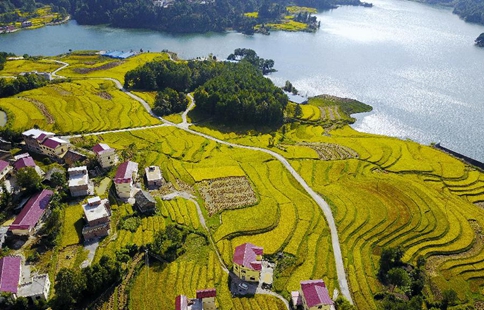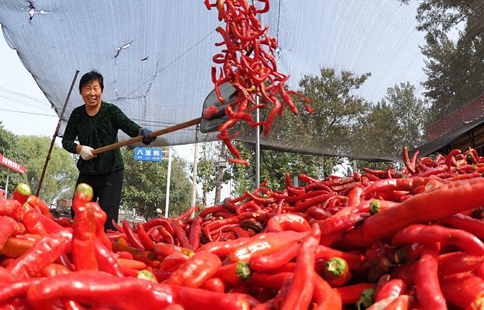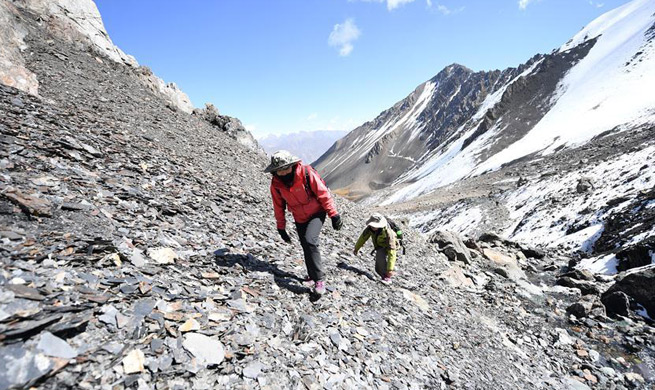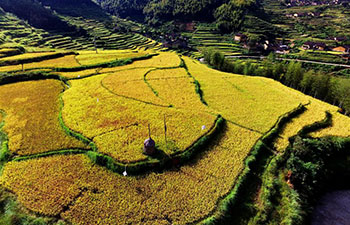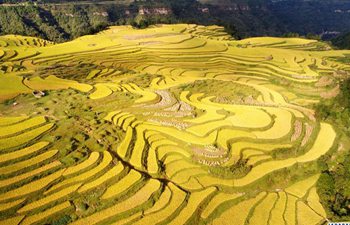LONDON, Sept. 26 (Xinhua) -- At least 1,000 cultivated species are already in danger as a new round of mass extinction of global wildlife is underway, leaving global food supplies vulnerable to diseases and pests, a report said Tuesday.
Three-quarters of the world's food currently comes from just 12 crops and five animal species, and this leaves supplies vulnerable to diseases and pests through large areas of monoculture, said the report published by Bioversity International, a global research group.
Of the estimated 7,000 edible plant species, just 30 are used to feed the world, said the report.
Tens of thousands of alternatives exist that can grow in difficult environments, have high nutrient content and have potential to increase their yields. However, almost 80 percent of land areas are used to grow only wheat, maize and rice, the report said.
Traditional crops and varieties represent just two percent of material stored in gene banks worldwide. Over-reliance on too few varieties and species is leaving the food system unnecessarily exposed to shocks and stresses, as well as neglecting a high-impact solution to major health, environmental and food security challenges, according to the review.
"Agrobiodiversity -- the edible plant and animal species that feed each and every one of us -- holds the key to future food security," Ann Tutwiler, director general of Bioversity International. "But we are failing to protect it, and tap into its potential to transform our food system for the better."
The destruction of wild areas, pollution and overhunting have started a mass extinction of species on the Earth, said the report.
The focus to date has been on wild animals -- half of which have been lost in the last 40 years -- but the new report revealed that the same pressures are endangering humanity's food supply.
"Until now, no single study has provided the evidence to showcase the extraordinary impact that investing in agrobiodiversity can have on improving food systems and advancing sustainable development at the same time," the director-general said.
The report, the research group's first scientific analysis, is intended to shed light on how agrobiodiversity can make humans' vulnerable food systems more resilient, sustainable and nutritious.
Agrobiodiversity is a "triple-win investment" for businesses and policymakers, the report said. As such, it set out how governments and companies can protect, enhance and use the huge variety of little-known food crops.
The guide provides evidence that investments in agrobiodiversity also play a critical role in tackling wider global targets such as reducing poverty and malnutrition, reversing environmental degradation, and combating climate change.
It highlighted examples including the gac, a fiery red fruit from Vietnam, and the orange-fleshed Asupina banana. Both have extremely high levels of beta-carotene, which the body converts to vitamin A, and could help the millions of people deficient in Vietnam.
Quinoa has become popular in some rich countries but only a few of the thousands of varieties native to South America are cultivated. The report showed how support has enabled farmers in Peru to grow a tough, nutritious variety.
Mainstream crops can also benefit from diversity. Earlier this year in Ethiopia, researchers found two varieties of durum wheat that produce excellent yields even in dry areas.
Fish diversity is also valuable, with a local Bangladeshi species now shown to be extremely nutritious, said the report.
As such, the guide lays the foundation for an agrobiodiversity index, a tool under development to help companies and countries to compare multiple strategies for investing in resilient and sustainable supply chains and product lines, through interventions in agrobiodiversity.
Leading agribusinesses such as Syngenta and Sainsbury's, as well as countries such as Italy, Peru and Ethiopia, have expressed interest in using the index, which is expected to launch in late 2018.
"The world is changing. Global warming, extreme weather and volatile prices are making it harder for farmers and growers to produce the foods our customers love," said Beth Hart, head of agriculture at Sainsbury's.
This is why the company is "committed to working with our suppliers, farmers, and growers in the UK and around the world to optimize the health benefits, address the impact and biodiversity of these products and secure a sustainable supply," Hart said. "We believe that participating in the development of the agrobiodiversity index will help us achieve this." Enditem







